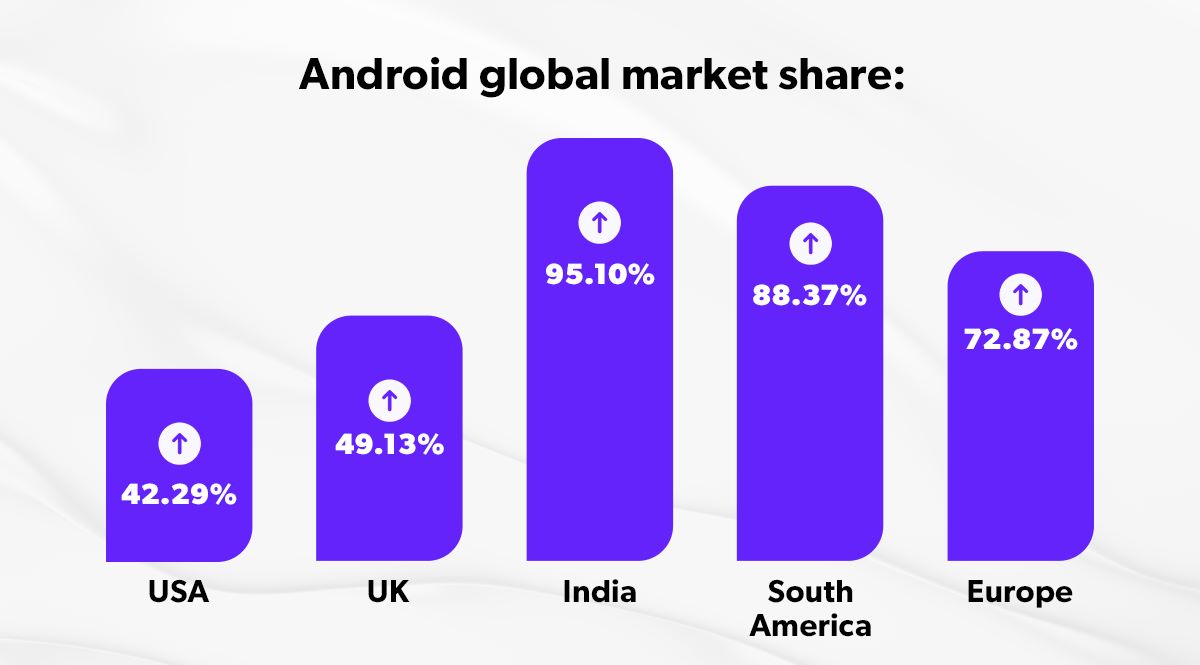
Historical Context of Android
Android was first introduced by Google in 2008. Initially, it was intended to be an open-source operating system for mobile devices, allowing manufacturers to customize and modify the code to suit their needs. This openness and flexibility were key factors in Android's rapid adoption by various manufacturers, including Samsung, HTC, and Motorola.
In the early days, Android faced stiff competition from Apple's iOS, which was already well-established in the market. However, Android's open-source nature and the ability of manufacturers to customize the operating system allowed it to gain traction quickly. By 2010, Android had started to gain significant ground, with devices like the HTC Dream and Motorola Droid becoming popular choices for consumers.
Rise to Dominance
The turning point for Android came with the release of the Samsung Galaxy S III in 2012. This device was a massive success, selling over 70 million units worldwide. The Galaxy S III's popularity can be attributed to its sleek design, powerful hardware, and innovative features like S Voice, which allowed users to interact with their device using voice commands.
The subsequent years saw a surge in Android's market share. The release of devices like the Samsung Galaxy Note series and the Google Nexus series further solidified Android's position. These devices offered high-end specifications, innovative features, and timely software updates, making them attractive to consumers.
Current Market Trends
As of 2024, Android holds a significant majority of the global smartphone market share. According to recent statistics, Android accounts for over 70% of all smartphone sales worldwide. This dominance can be attributed to several factors:
Manufacturer Diversity
Android's open-source nature allows a wide range of manufacturers to produce devices running on the operating system. This diversity leads to a broader selection of devices catering to different price points and consumer preferences.
Customization
Android offers extensive customization options, allowing users to personalize their home screens, notification shades, and even the look and feel of the interface. This level of customization is unmatched by iOS and appeals to a wide range of users.
Hardware Variety
Android devices range from budget-friendly options like Xiaomi's Redmi series to high-end flagships like Samsung's Galaxy S series. This variety ensures that there is an Android device to suit every budget and requirement.
Software Updates
While iOS has traditionally been known for its timely software updates, Android has made significant strides in this area. Google's Pixel series, for instance, receives timely updates directly from Google, ensuring that users have access to the latest security patches and features.
Innovative Features
Android has consistently introduced innovative features that enhance user experience. For example, the introduction of split-screen mode, multi-window support, and advanced AI capabilities have made Android more versatile and user-friendly.
Future Projections
Looking ahead to 2024 and beyond, several trends are likely to shape the future of Android market share:
5G Adoption
The widespread adoption of 5G networks is expected to further accelerate Android's growth. With faster data speeds and lower latency, 5G-enabled Android devices will offer unparalleled performance and connectivity.
Foldable and Flexible Displays
The introduction of foldable and flexible displays is set to revolutionize the smartphone industry. Devices like Samsung's Galaxy Z Flip and Motorola's Razr offer a new form factor that combines the portability of a flip phone with the functionality of a smartphone.
Artificial Intelligence Integration
AI is becoming increasingly integral to smartphones, and Android is no exception. Features like Google Assistant, Google Lens, and advanced machine learning algorithms will continue to enhance user experience and provide more personalized services.
Security Enhancements
As concerns about data privacy and security grow, Android is expected to focus more on enhancing its security features. This includes improved biometric authentication methods like facial recognition and fingerprint scanning, as well as enhanced encryption protocols.
Sustainability Initiatives
With growing environmental concerns, there is a rising trend towards sustainable electronics. Android manufacturers are likely to focus on eco-friendly materials, energy-efficient designs, and sustainable manufacturing practices.
Challenges and Opportunities
Despite its dominance, Android faces several challenges:
Fragmentation
One of the major challenges facing Android is fragmentation. The operating system runs on a wide range of devices with varying hardware specifications, which can lead to inconsistent performance and delayed software updates.
App Store Competition
The Google Play Store faces competition from the Apple App Store, which has a reputation for stricter app review processes and higher quality apps.
Privacy Concerns
With increasing concerns about data privacy, Android must address these issues through robust security measures and transparent data handling practices.
Competition from Emerging Players
The rise of emerging players like Huawei and Xiaomi poses a significant threat to established manufacturers. These companies offer high-quality devices at competitive prices, which can erode market share.
Final Thoughts
Android's market share is a testament to its adaptability and versatility. From its humble beginnings as an open-source operating system to its current status as a global leader, Android has consistently evolved to meet the changing needs of consumers. As we look ahead to 2024 and beyond, it is clear that Android will continue to play a pivotal role in shaping the future of smartphones.
The future holds exciting possibilities with advancements in 5G technology, foldable displays, AI integration, and enhanced security features. However, challenges like fragmentation, app store competition, privacy concerns, and competition from emerging players must also be addressed.
Ultimately, Android's ability to innovate while remaining user-centric will continue to drive its growth and dominance in the smartphone market. As technology continues to advance at an unprecedented pace, one thing is certain: Android will remain a major player in the world of smartphones for years to come.
